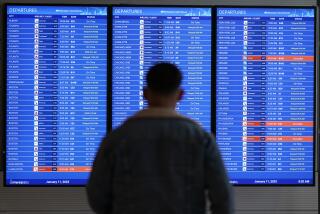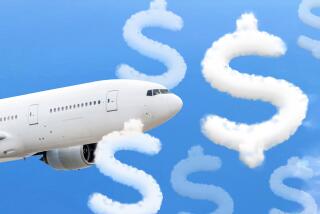Airlines globally may lose billions this year
- Share via
Airlines face a global downdraft far worse than the turbulence after the Sept. 11 terrorist attacks that sent four major U.S. carriers into bankruptcy, an airline trade group warned Tuesday.
The International Air Transport Assn. predicts that airlines worldwide will lose $4.7 billion in 2009 as plunging traffic offsets a deep drop in fuel prices, one of the carriers’ largest expenses.
Industry revenue is expected to fall 12% to $467 billion, the association said. By contrast, revenue declined 7% in the aftermath of the terrorist attacks, which helped push United Airlines, US Airways, Delta Air Lines and Northwest Airlines into filing for bankruptcy protection.
The shocks to manufacturing and global finance have rippled through business travel, which drives carriers’ profit on overseas routes. Revenue has plunged on flights across the Atlantic and the Pacific as more corporate travelers fly coach -- or stay home.
“The industry is in intensive care,” warned Giovanni Bisignani, the association’s director general and chief executive. “Airlines face two immediate fundamental challenges: conserving cash and carefully matching capacity to demand.”
U.S. carriers, sent into crisis mode when fuel costs hit the stratosphere last year, may be better poised to ride out the situation. They began to raise cash last summer before financing became difficult and started cutting unprofitable routes last fall to help stem losses.
Capacity in the U.S. domestic market is down 9% year over year, roughly equivalent to grounding a major airline. Airlines around the globe have trimmed their flights about 4%, according to OAG, a clearinghouse for airline schedules.
The air transport association expects U.S. carriers to show the best performance in the world this year, earning a $100-million profit. Asian carriers should fare worst, losing a total of $1.7 billion as once rapidly growing aviation markets in China and India contract.
Even so, analysts warn that U.S. carriers such as United and American Airlines that are heavily dependent on business travelers have little cushion to absorb other business shocks, such as a surge in oil prices.
“Cash balances are still uncomfortably low,” wrote UBS analyst Kevin Crissey in a March 9 report. “On our estimates none of the airlines have a liquidity issue, but a materially worse revenue environment combined with stable fuel prices and continued closed credit markets could challenge this view.”
.
More to Read
Inside the business of entertainment
The Wide Shot brings you news, analysis and insights on everything from streaming wars to production — and what it all means for the future.
You may occasionally receive promotional content from the Los Angeles Times.










